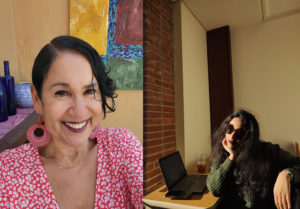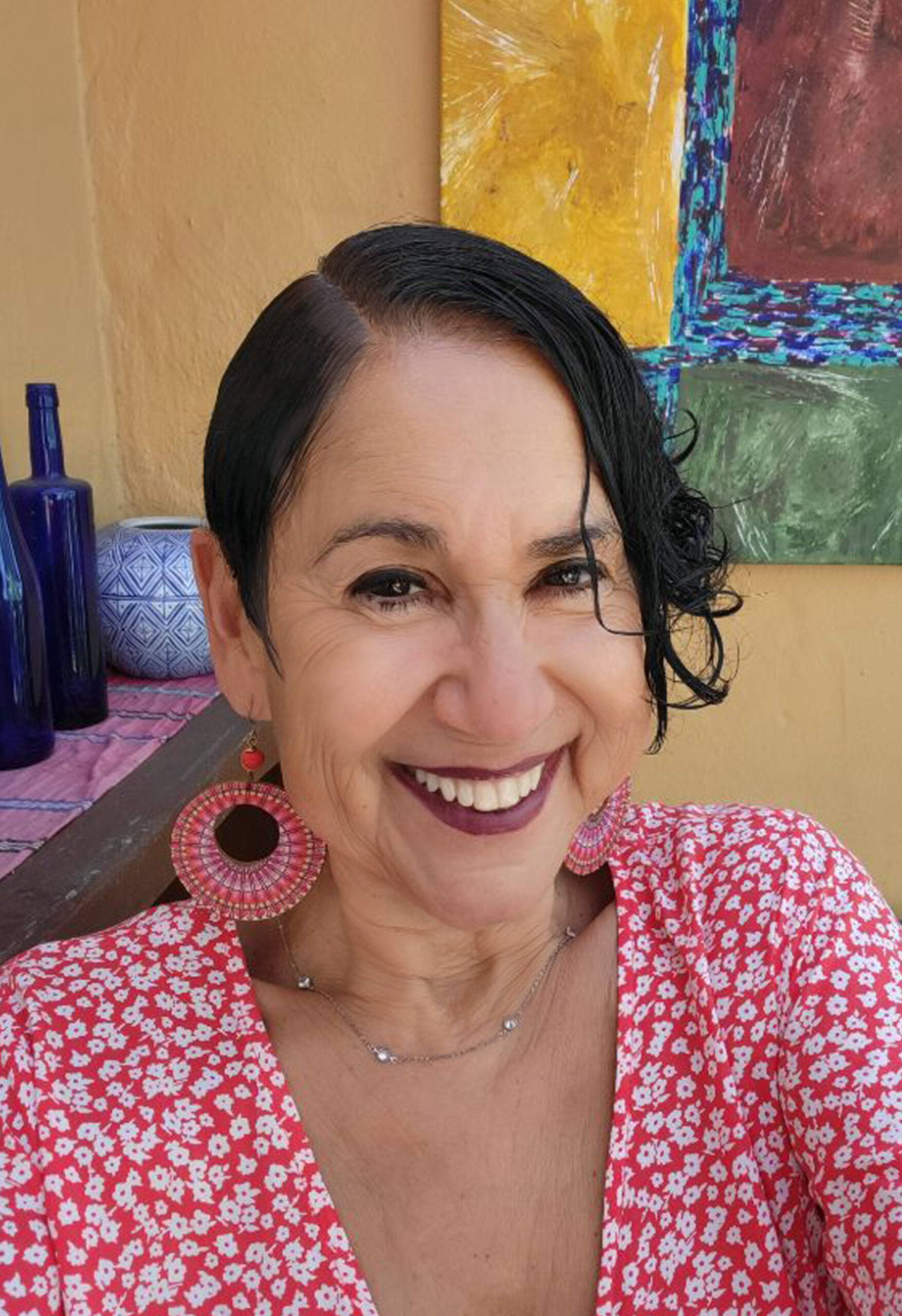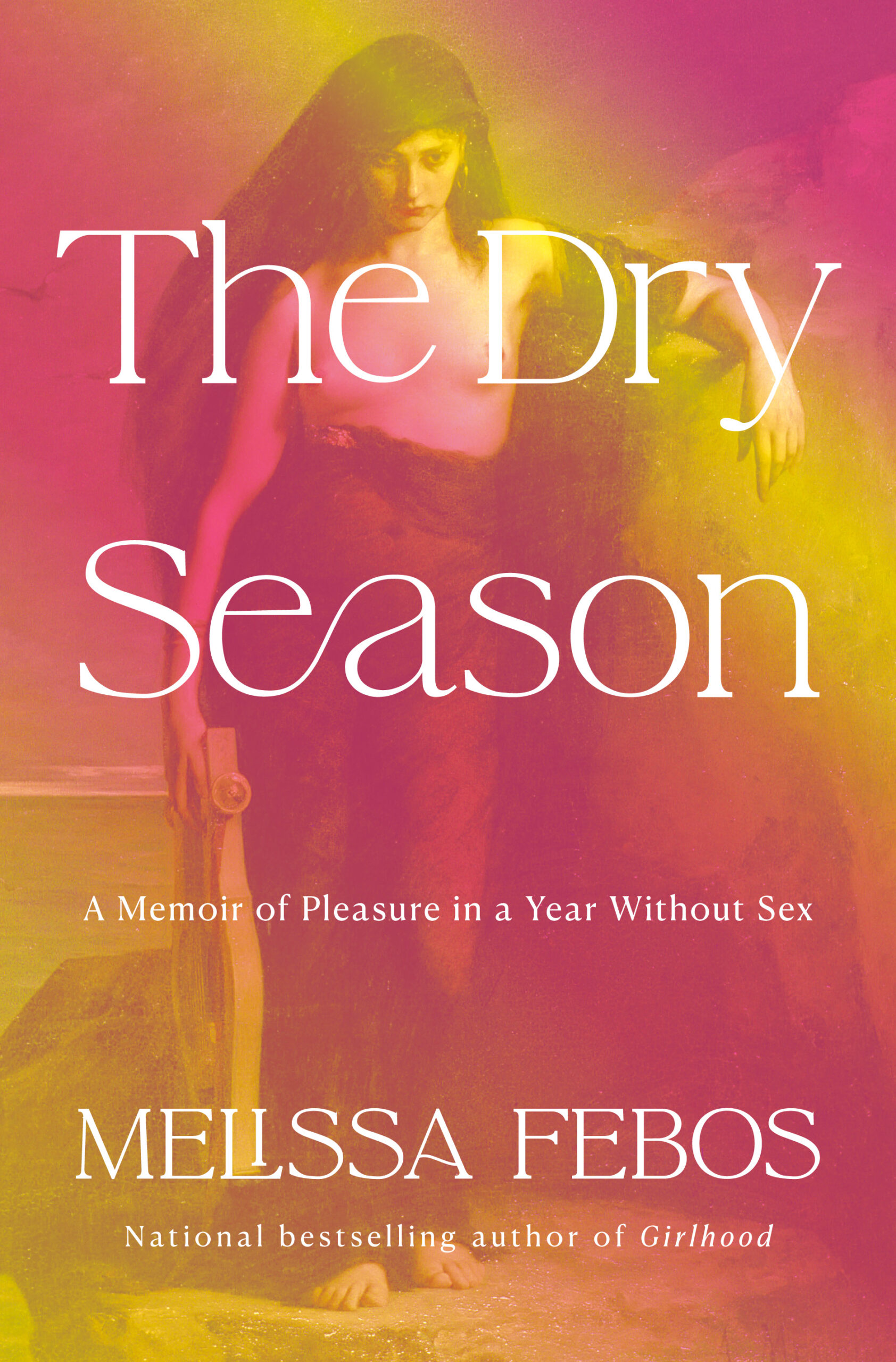
Susana Praver-Pérez’s work, moving fluidly between English and Spanish, from Puerto Rico to California and New York, is a moving meditation on how place shapes our understanding of ourselves and the world. Praver-Pérez’s debut collection Hurricanes, Love Affairs, and Other Disasters, and recent collection, Return Against the Flow, reckon with how we make a place home, considering with care and generosity the landscape of Puerto Rico and its impact on her selfhood. In lyrical, narrative poems, Praver-Pérez examines how geography is defined by its landscape and people. Through the narrativization of lived experience and the intertextual poetry of others, Praver-Pérez’s collection, Return Against the Flow is a necessary documentation of the way language shifts across landscape and time.
In this interview, VIKA MUJUMDAR and SUSANA PRAVER-PÉREZ discuss place and geography, the shifting influences of language, and the transitory nature of diasporic belonging.
Vika Mujumdar: I’m struck that “Return Against the Flow,” one of the poems in your first collection, Hurricanes, Love Affairs, and Other Disasters, becomes the title poem in your second collection. What was that process like for you? How did you decide that “Return Against the Flow” would be a point of departure for this book?
Susana Praver-Pérez: My late husband was from Puerto Rico. I’m not, but I fell in love with the island. Returning there was a dream he and I shared that never happened during his lifetime; he passed away in 2007. Years before writing the book, I started to think I needed to return, for him, for me. I was going to buy a home there just before Hurricane María, but it didn’t work out. After María, things became very, very difficult. I was thinking, I’m going to do this anyway. But my friends who lived on the island discouraged me, saying things like, “This is crazy. This is such an unstable place. This is such a hard country to live in right now. Why would you do this?” And that’s where that first poem came from. And at that time, I didn’t end up buying a home. But the metaphor of returning against the flow stayed with me. In the poem, I wrote, “I’m a car in the bus lane, driving against the flow on a one-way street.” That really happened. I was driving in San Juan, and I wasn’t familiar with some of the roads. I was driving against the flow of traffic, and someone came out of a shop yelling, “stop, stop, you’re gonna get killed!” And as I turned the car in the right direction, I said, there’s a poem. That’s how the title poem and theme of my second book came about.
As a poet, any moment can be research for your work. As I’m there trying to save my life, I’m thinking, I have to remember and write that poem. And so, I did. In 2021, when I did buy a home there, I thought about the whole process, the history, and how I came to that pivotal moment. And so that became the central metaphor of the book, the decision to return to a difficult place when people are leaving. I started exploring what return meant given I’m not from the island. I started thinking about the concept of return being more than a physical geographical return—to return to one’s roots, return to a person, return to oneself.
VM: There seems to be a productive idea here that a place is more its people than its geography. And thinking about intertextuality, the poems here are constantly interrupted or disrupted by the work of other writers, through the epigraphs. What was your process of bringing these writers in? Was that a choice you made while writing the poems, or later, perhaps during organization? How did you approach this?
SPP: This second book, Return Against the Flow, came out in February 2024 with Black Lawrence Press. But originally, it had been accepted by Nomadic. I had a very close relationship with my publisher at Nomadic, and after the first book, I was telling him about what I wanted to do in the second book, and he said to me, “Why don’t you have snippets of other writers?” At first, I struggled with the idea. And then when I started thinking about what the book really meant and thought about the larger community of writers—because I’m somebody who loves poetry in the context of community—it started to make sense to me. I read poems along the way that resonated with me, I would save them and see if they’d have a place in my book. The book goes back and forth between New York, Puerto Rico, and California, so I had the task of getting the reader to the next geographical place naturally. There’s a page, where there are three epigraphs—one from Denice Frohman’s “Puertopia,” then part of a song by Roy Brown about how Puerto Ricans were enticed to come to New York for work, and then the third by Isa Guzman about how communities in New York looked like Puerto Rico and vice versa because of the back and forth. Those epigraphs created a bridge to “get” to New York.
VM: I think it’s productive to think about the themes you’re writing about in this larger context. I found it interesting to consider these poems not just on the level of individual poems within the collection, but also as a larger conversation that feels important to you and the book. You don’t often see a collection with this many epigraphs. Thinking about how deeply this book is in conversation with the work of other writers, and how it’s situating itself in this lineage, I’d love to know who your biggest influences are as a writer, both in terms of specific poets and collections, thinking both about Puerto Rican literature and more broadly as well.
SPP: One of my favorite poets is Martín Espada. I’ve looked up to him for a long time because I admire his ability to address social justice issues from an embodied point of view. He’s been one of my biggest influences. And another poet who has influenced me a lot is Patricia Smith. I heard her speak when she was out here at Mills College, and I was very moved by her work. I read her book Blood Dazzler about Hurricane Katrina. It’s brilliant. It was her MFA thesis. I would say that book taught me more about poetry than any other collection I can think of because she is so inventive in terms of anthropomorphizing things. In one of her poems, there’s a conversation between two hurricanes, which blew my mind, and expanded my thinking.
As a bilingual writer, you have two languages to find assonance and alliteration in.”
VM: How did you first get into poetry?
SPP: I’ve been writing since I was a teenager, but I wrote for myself, just for the joy of writing. I never thought about publishing. In 2011 I co-founded a cultural salon with a friend based around Puerto Rican culture. And that was a place where I cut my teeth. I would read to our community, some who are artists and some who aren’t. I enjoyed that as a place of connection and it pushed me to start writing more. At one of our cultural salons, Raina Leon, the editor of The Acentos Review was present. I didn’t yet know who she was professionally. We had both read stories, and when she said she’d like to publish mine, it was a pleasant surprise. So, even though I hadn’t sought it out initially, I liked how getting published felt. Then, Hurricane Maria happened, and I sent in some poems because I just really felt I needed to share what I was thinking.
VM: Thinking about your influences, I found your relationship to language and translation as very central to both Return Against the Flow, and to Hurricanes, Love Affairs, and Other Disasters. So many of the epigraphs are translated works, some of the poems are bilingual, and I was wondering if you could speak more to your relationship with language and translation, both as a reader and a writer.
SPP: As a bilingual writer, you have two languages to find assonance and alliteration in. For me one of the things I focus on when I’m writing is if the sounds work. I spend a lot of time looking for just the right word. Sometimes the word is in a different language than the base language of a poem, and I try to make it understandable in the context of the poem. I find when you’re writing within a certain context you need to employ language that reflects that cultural context.
VM: As a bilingual writer with poems that are in both Spanish and English in this collection, did you write those poems in one language and translate into the other? Or was it simultaneous? What was the process of writing those bilingual poems?
SPP: There are two poems that are translated, and those were written in Spanish. My criterion was that if they were English poems, since the base language of the collection is English, I wasn’t going to translate them. If they were Spanglish poems, I wasn’t going to translate them, because Spanglish becomes its own language. But if I wrote them in Spanish, I would translate them into English—since English was the base language of the book.
VM: Building on that idea of language and translation, I found a very expansive sense of language as the book moves back and forth between Spanish and English. There’s such a generosity to all the different languages in the collection, thinking in particular about the lines. In some lines, you have words that go into Spanish and then back into English, and I’m struck by the fluidity and slippage between language. Very similar words appear in proximity, and I’m curious about your relationship to the malleability and fluidity of language.
Bilingual poetry is more of a preservation of a suppressed language as opposed to colonization of language.”
SPP: In my own life, I go in and out of Spanish and English, and my community does the same. Some of that is to keep the flavor of the language present. To me, it’s also how I think. Throughout the book, you might have realized that the beginning is more English-based, but there’s a certain point where it’s more in Spanish, and that’s when I was in Puerto Rico. There’s one poem dedicated to Tito Matos, that is predominantly in Spanish. I didn’t translate it, because my criterion was that if it was a Spanglish poem I wouldn’t translate it. And that poem is so much about the musicality of the language, I didn’t want to mess with it. He was a tremendous musician, so I needed to keep that poem musical. I happened to be in Puerto Rico when he died, and I was at the memorial with another friend who was a poet. When we left, she said she had to go home and write a poem about this, and I thought that I should do the same. I couldn’t find a way to enter the poem that felt like it captured the enormity of the feeling of that day until eight months later, inspired by a décima by Javier Curet.
Interestingly, I had a conversation with some traditional poets in Puerto Rico who were very much against writing in Spanglish. They felt it was a cultural invasion of the language. And I said that in the States, bilingual poetry is more of a preservation of a suppressed language as opposed to colonization of language, and they agreed that in that context it was a whole different thing. But at that moment, I made the decision that my next book, which I’m just finishing, was going to be in one language, and then I was going to translate it into the second.
VM: In both your collections, but particularly in Return Against the Flow, there’s a compelling sense of self concerning place and home. Thinking about how you give voice to the constant flow between diaspora and home, and not just a flow in one direction, could you speak about how you see the triangular relationship between diaspora, return, and home and how you write it?
SPP: When I decided to return to Puerto Rico, I was still working. I was going back and forth between Oakland and San Juan because I still had work obligations, and my apartment wasn’t very livable. I didn’t have any hot water, and sometimes, I had no water at all. Going back and forth was like a microcosm of what’s been happening in history for a century. A lot of my Puerto Rican friends are back and forth all the time as well; it is a mobile community. I wanted to create that feeling of what it is to move and resettle. In a poem by Nicole Delgado, she said, “sometimes leaving and returning makes you a stranger.” When I went back, there were many changes. And of course, after Hurricane Maria, the whole landscape was so different, especially with the influx of investors. Landscapes change all the time. There were two poems in the second book called “Castles in the Air.” I’d written the first one for my first book. I was doing a recorded poetry project, and I thought well, since I’m in Puerto Rico, I’ll record myself reciting the poem in the places where these things happened. I went to that house where I’d written the poem, and it was gone, so I started talking to the neighbors, and learned what had happened to the house—it had been bought and bulldozed by the neighboring hotel that had wanted it for parking. And as I started walking down the street, the poem started coming out, in rhyme. I was impacted by seeing history unfurl so quickly; I tried to document what’s happening—gentrification and the destruction of a community—by writing the stories of the houses and the people who lived in them.
VM: I’m particularly interested in the way you’re thinking about home not just as an intangible idea, but also as a very material construct. Thinking about the poem “Return Against the Flow,” and how it appears in both collections and serves as a microcosm of your work thematically and formally, I’m curious if and how you see it as an ars poetica?
SPP: A lot of my poems start out with real-life situations, as in this poem too. “The old man with hair dyed black” is a real person. I went to his home. His aspiration was to leave the island. It was a moment where I was examining my own aspirations. But I also saw the irony and poetic voice in the situation. I mentally record images—not consciously, but they make an impact on me, and then I’ll see the poetry within them. Sometimes they’re metaphorical. I think where the poet’s work comes in is recognizing how the image can reflect on happenings in real life. I see seeds for poems everywhere; I think our lives are filled with poems and it’s just a question of us recognizing them, picking them up, and then of course shaping them with the written word.
Susana Praver-Pérez is a Pushcart-nominated, bilingual poet and visual artist. A former Physician Assistant and Associate Medical Director at La Clinica de la Raza in Oakland, California, Susana left medicine in 2021 after four decades of community service, to pursue her passion for poetry and art on a full-time basis. Susana studied Creative Writing at Berkeley City College, Naropa Institute, U.C. Berkeley’s “Poetry for the People”, and is an alumna of both Macondo and Las Dos Brujas Writers’ Workshops. Her first full-length book of poetry Hurricanes, Love Affairs, and Other Disasters (Nomadic Press 2021) received the PEN Oakland Josephine Miles Award for Excellence in Literature (2022). Her second full-length collection Return Against the Flow, published by Black Lawrence Press (2024), was included by both Ms. Magazine and NYU’s Latinx Project among their top poetry picks for the year. Susana divides her time between Oakland, California and San Juan, Puerto Rico and writes through the lens formed in the liminal space between languages, cultures, and geographies.
Vika Mujumdar was born in New Jersey and raised in Pune, India. She holds an MA in Comparative Literature from UMass Amherst, where she is currently an MFA student in Fiction. Her work has appeared in the Cleveland Review of Books, the Brooklyn Rail, Wasafiri, and elsewhere. She edits Liminal Transit Review.




